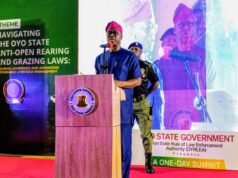In 1948, while Egbaland quaked under the yoke of a massive revolt spearheaded by Chief (Mrs.) Funmilayo Ransome-Kuti against the imposition of taxation on women by the Egba monarchy under the Alake, Oba Oladapo Samuel Ademola and allegations of impropriety in the use of these taxes, one small lad of about ten years resided inside the Egba palace whose life trajectory was going to be affected by the uprising. The young lad who lived in the palace as the non-violent protest raged was Lamidi Olayiwola Adeyemi. Unknown to many, even at a tender age, young Obajuwonlo – the palace cognomen that young Lamidi was given in the ancient palace of his father, the Alaafin of Oyo, Oba Adeniran Adeyemi – was sure he would one day ascend the throne of his forefathers back in Oyo. Two early tutelages, one in the palace of the late Alake of Egbaland, Oba Ademola and another one in Lagos in the home of Sir Kofoworola Adekunle Abayomi and his wife, Lady Oyinkansola, remain indelible in the heart of the man who would be one of the most famous traditional rulers in Africa.
None of the princes of Oba Adeyemi stayed in the palace. He sent his children away from the palace, into the homes of people who were struggling with life, to do menial jobs and confront the rigour of life. According to Oba Adeyemi, his father abhorred indulgent princes and chose to have his children scoop life lessons that moulded great men outside the power and glory of the palace. For instance, while young Lamidi trained as an Islamic cleric in Iseyin, he also underwent tutelage in Oyo under a disciplinarian and an Anglican school teacher, Pa Olatoregun, an Anglican school teacher. In the palace of Egba, Lamidi had his early education at the Ake Palace Elementary School.
The oppressive tax regime had given birth to the Abeokuta Women’s Union (AWU) which Ransome-Kuti, a head teacher of a local school, spearheaded. She had galvanized a political organization into place with the inputs of working-class market women and middle-class women under the same umbrella to fight the colonial rule structure which midwifed the oppressive tax regime. She also sought to fight the reigning patriarchal nature of society which ensured that this oppression was not censured. The refusal of many of the women living in Abeokura and its environs to pay the tax had landed them either in jail or their being made to pay fines. Ransome-Kuti and her crew in AWU bombarded the colonial office with petitions against the Alake and the Resident between August 1946 and May 1947.
When the women delegation met with the Alake on October 5, 1946, still, no respite came, culminating in the final decision by the Alake to increase the flat rate tax on women, with the active connivance of the Resident. This led to mass protests of about a thousand women who marched outside the king’s palace with their furious demand and legendary hate songs against the Alake and demanding the abolishment of direct taxation in mid-October 1946.
Like the incandescent Afrobeat songs of her son, the irrepressible Fela, Ransome-Kuti helped compose a stinging song against the Alake in Yoruba, which translation ran thus: “Idowu (Alake) you have used your penis as a mark of authority against us for far too long a time; posturing that you were our husband. Today, however, the table has turned and we are poised to reverse the equation by deploying our vagina as a weapon of conquest to play the role of husband on you… O you former men conquerors, the head of the vagina has sought vengeance.” It was in part a feminist epistemology.
Rather than be mild on the women, the resident furiously tackled the protesting women with the aid of teargas canisters and beat up the women mercilessly. The protests continued nevertheless. The women subsequently sent petitions to Britain against the Resident and Alake and on January 3, 1949, the Alake had to abdicate the throne after his deposition by the British government. As the Alake abdicated the crown and left with a tiny entourage out of Egbaland, young Lamidi made up the small crowd. He had been sent by his father, Oba Adeyemi to his friend, the Alake to equip him with experiences of other lands and climes, in preparation for the arduous task of adulthood and possible future Alaafin.
While recalling that painful departure from the throne by the Alake, Oba Adeyemi said the entourage immediately proceeded to Osogbo, Osun State, home of the matronly fish river goddess, where Oba Ademola was to spend the years of his exile. According to him, as they were arriving Osogbo, the entourage heard a very deep trumpet miles away welcoming the exiled king into Osogbo. As they savoured the trumpet, the young Lamidi moved close to the Alake and told him that he was sure that the firstborn (Aremo) of his father, Oba Adeyemi, Tiamiyu Adebayo Adeyemi, must be the one behind the trumpet. The Aremo, in those days, said the Alaafin, were very powerful, had their separate quarters and were indeed almost as powerful as the king.
Oba Ademola eventually arrived his quarters where he was to spend his exile years and one of his first bothers was the future of young Lamidi. His fear was that he would debar the young boy the opportunity of pursuing his education with the uncertain life that undergirds the life of an exile. The king immediately communicated this fear to Aremo Adeyemi, suggesting perhaps that he be returned to Oyo palace.
“Kabiyesi, I don’t have the power to return him to my father, the Alaafin more importantly, Kabiyesi, why will Lamidi leave you now at this time of trouble? Eyele o ni b’onile je, ko b’onile mu, ko wa d’ojo ikunle, k’eyele o fo lo (the pigeon will not dine and wine with its principal and abandon him at his time of travails).
Aremo Adeyemi was said to have told Oba Ademola. When Alake asked young Lamidi for his view on whether to leave or stay, the lad merely agreed with his eldest brother and chose to remain with the troubled Oba Ademola.
According to Oba Adeyemi, seeing how young Lamidi exhibited precocious qualities and leadership traits, especially his selfless service to him at such moment of travails, the exiled Alake called him repeatedly and told him that though he might not be alive to witness it, he was sure that the boy would rise to be a great man and a statesman in the nearest future.
As Alaafin recalled in an interview with me, Oba Ademola’s wife, Olori Wuraola, who lived at No1, Okelewo Street, Ibara Abeokuta, was his palace mother who equipped him with all the paraphernalia of royalty, prepared him for the future role as a foremost traditional ruler in Africa and taught him all that was needed to be a statesman. She indeed took him through and he learnt from this amazon the rope of traditional dignifying royalty and kingship. According to the Alaafin, Olori Wuraola apparently saw into the future and knew that the young Lamidi would mount the throne of his forefathers. According to the Alaafin, when her projection eventually came to pass, Olori Wuraola was one of those who visited him regularly at the palace in Oyo and emboldened him to forge a monarchy that has no parallel in this clime. “I am an Ake, Ibara man,” Oba Adeyemi proudly said. “In fact, the present Olubara of Ibara knows me well and my linkage to the Ake palace.”
However, the travails of the life of Oba Ademola were so huge that young Adeyemi had to be sent back to Oyo. There, he scooped up all the paraphernalia of tradition and culture. Still not wanting him to be in the vicinity of the palace so as not to be spoilt by the perks of royalty and power, Oba Adeniran again sent the young boy to his friend, Sir Kofoworola Adekunle Abayomi, the famous doctor in Lagos. It was while with the ophthalmologist that he attended the famous St Gregory’s College, Lagos. Born on July 10, 1896, Abayomi was one of the founding founders of the Lagos Youth Movement which was founded in 1934 and which was indeed the first political movement against colonialism. He was elected into the Legislative Council in 1938. Kabiyesi recalled that Abayomi lived on No 2, Ali Street, Tinubu. The young Lamidi stayed with the ophthalmologist till 1959 when his father, the Alaafin, was deposed and sent to No 33, Egerton Lane in Lagos.
In 80 years on earth, Oba Adeyemi has lived up to the futuristic projections of Alake Ademola, Olori Wuraola and all those who foresaw that he would be a great man. He has contributed immensely to the jurisprudence of ancient monarchies through his fecund knowledge and preparedness to scoop knowledge every day. His forte is that he reads and acquires knowledge every minute. The Alaafin reels out folklores, lore and mores of the Yoruba with a baffling exactitude and dances to the bata drum with the agility of a toddler. One day, Alaafin went to the domain of another great but young traditional ruler and his palace drummers, apparently steeped in the rivalry of his host’s stool and the Alaafin’s started casting aspersions on the Alaafin through the beats of their drums. Even when the new monarch didn’t understand that a war was being courted through his drummers, Kabiyesi Alaafin warned the monarch to caution his drummers. He there and then recounted the messages of the drummers’ rhythm, to the astonishment of the new monarch.
Alaafin’s contribution to jurisprudence on palace administration is unparalleled. He is unarguably the traditional ruler who speaks to governmental power through his pen the most among past and present Obas. This writer was at a meeting with Kabiyesi and a Senior Advocate of Nigeria (SAN) one day where the SAN reeled into Oba Adeyemi’s deep knowledge of law and how he always led his counsels on the jurisprudential path they should tread in matters that had him as litigant. He is blessed with a power of recall that is legendary, even in well advanced age. Professor D. Y. Peel of the University of Cambridge who once visited the Alaafin at the palace, in company of one of his students, Professor Wale Adebanwi, was shocked when the Alaafin recounted by rote details of British history. “Kabiyesi, you are telling me my history!” he was quoted to have shouted, enthralled.
Here is wishing the Iku Baba Yeye more years on earth as he celebrates 80 years on the throne of his forefathers.
Dr. Adedayo is on the Tribune’s editorial board.
































